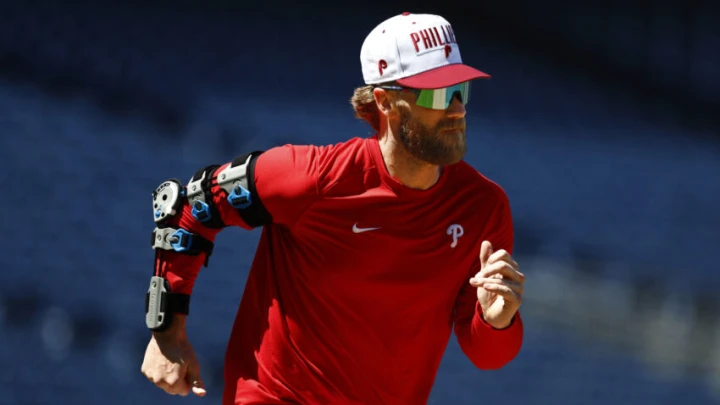The bryce harper injury topic continues to dominate MLB discussions — and for good reason. When a superstar like Harper misses time, it not only affects the Philadelphia Phillies’ lineup but also shakes up the entire National League picture.
In this in-depth guide, we’ll explore everything you need to know about Bryce Harper’s injury journey — from his most recent setbacks to his long-term recovery outlook. Whether you’re a fan, fantasy manager, or simply curious about how elite athletes manage recurring injuries, this comprehensive breakdown covers it all.
1. Recent Bryce Harper Injury Update (2025)
Elbow Contusion Incident
In May 2025, Bryce Harper suffered a scare when a fastball struck his right elbow, the same one that underwent major surgery in 2022. He immediately left the game, sparking concern among fans and analysts.
Initial tests, however, brought relief — no fracture or structural damage was found. The diagnosis was an elbow contusion, essentially a deep bruise that causes swelling and soreness but generally heals with rest and treatment.
Harper missed a few games to let the swelling subside but avoided a long stint on the Injured List (IL). His manager confirmed that the team would “take it day by day,” prioritizing Harper’s long-term health over rushing him back too soon.
Wrist Inflammation
Shortly after recovering from the elbow contusion, Harper began dealing with right wrist inflammation — a recurring issue throughout his career. This led to him being placed on the 10-day IL in early June 2025.
During that period, Harper underwent therapy focused on reducing inflammation, regaining grip strength, and testing swing mechanics in controlled settings. After missing roughly 22 games, he was cleared for return and rejoined the lineup as a designated hitter.
The medical staff noted that Harper’s wrist would need ongoing monitoring to prevent flare-ups, particularly during stretches of heavy play or cold weather.
2. Harper’s Past Surgeries and bryce harper injury
To understand the significance of the current bryce harper injury, it’s essential to look at his medical background. Over more than a decade in professional baseball, Harper has battled through multiple injuries, proving his toughness and determination time and again.
Tommy John Surgery (Right Elbow, 2022)
One of Harper’s most serious injuries came in late 2022 when he tore the ulnar collateral ligament (UCL) in his right elbow. The resulting Tommy John surgery sidelined him for months and forced him to miss the start of the 2023 season.
What made Harper’s recovery remarkable was how quickly he returned — months earlier than the typical timeline for such a procedure. Initially limited to designated hitter duties, he gradually worked back into fielding, showing impressive resilience.
Left Thumb Surgery (2014)
Earlier in his career, while with the Washington Nationals, Harper tore a ligament in his left thumb while sliding into third base. The injury required surgery and cost him significant time that season. It was one of his first major setbacks as a young star.
Other Notable Injuries
Over the years, Harper has dealt with a variety of injuries, including:
- Wrist inflammation and soreness (multiple seasons)
- Back tightness and spasms
- Lower-body strains, including foot and calf issues
- Hit-by-pitch bruises on the hands and arms
These recurring issues highlight the physical toll of Harper’s aggressive playing style — diving for catches, sprinting on base paths, and standing close to the plate during at-bats.
3. Common Injuries bryce harper injury
When analyzing the pattern of bryce harper injuries, a few consistent themes emerge. Each category reveals both the cause and the challenge of managing them effectively.
1. Hit-by-Pitch Injuries
Harper’s fearless stance at the plate has made him a frequent target for errant pitches. Fastballs to the hand, wrist, and elbow have caused repeated trauma. While many result in minor bruising, some have led to more serious inflammation or temporary mobility issues.
2. Ligament Injuries
Both his elbow (UCL) and thumb injuries involved torn ligaments — structures that are crucial for grip strength and throwing mechanics. Ligament injuries are slow to heal and can easily flare up if not given adequate rest.
3. Inflammation and Overuse
As a power hitter, Harper’s swing places intense rotational strain on his wrists and back. Over time, this has led to chronic inflammation. While not always serious enough to warrant the IL, these issues can affect his timing and bat speed.
4. Lower-Body Strains
Like most athletes, Harper has also battled minor muscle strains and foot discomfort. Though rarely headline-grabbing, these problems can compound fatigue and subtly influence his power output or fielding range.
4. Impact of Injuries on Performance bryce harper injury
The bryce harper injury discussion wouldn’t be complete without addressing how these setbacks affect his on-field performance and overall contribution to the team.
Swing Mechanics and Power
When Harper’s wrist or elbow is compromised, even slightly, it affects bat control. Reduced range of motion can cause dips in power, contact quality, and consistency. Players often compensate subconsciously, altering their swing planes — which can lead to slumps.
Positional Adjustments
Since his Tommy John surgery, Harper has been used more frequently as a designated hitter or first baseman to reduce throwing stress. This strategic shift has allowed him to stay in the lineup while protecting his elbow from overuse.
Load Management
The Phillies’ coaching and medical staff have adopted a cautious approach, occasionally resting Harper against certain pitchers or during back-to-back games. Though frustrating for fans, these rest days are crucial to preserving his long-term availability.
Mental and Emotional Impact
For an intense competitor like Bryce Harper, being sidelined can be psychologically challenging. However, his leadership and maturity have helped him channel frustration into motivation — returning stronger each time.
5. Phillies’ Approach to Recovery and Load Management bryce harper injury
The Phillies’ handling of the bryce harper injury situation in recent years has demonstrated a blend of modern sports science and experience-based caution.
Comprehensive Diagnostics
Immediately after any injury scare, Harper undergoes X-rays or MRIs to rule out structural damage. The medical staff prioritizes accuracy over speed in diagnosis, ensuring that no hidden issues linger.
Rehabilitation Programs
Once cleared of serious damage, Harper follows a tiered rehab program:
- Rest and swelling control using ice, compression, and therapy.
- Light mobility exercises to maintain range of motion.
- Progressive batting drills, from dry swings to live pitching.
- Game reintroduction in limited roles, often as a DH.
This systematic approach prevents re-injury and allows Harper to test his comfort level incrementally.
Communication and Monitoring
Manager Rob Thomson and the team trainers maintain open communication with Harper. They track pain levels daily, adjust workloads, and allow Harper to give input on how his body feels. This transparency builds trust and keeps recovery on course.
6. Long-Term Outlook and Future Expectations bryce harper injury
For the 2025 Season
As of now, Harper’s health trajectory looks positive. His wrist has responded well to rest, and the elbow contusion appears fully healed. However, managing fatigue will remain critical throughout the season. Expect periodic rest days and potential defensive limitations.
For the Future
Given Harper’s history, the Phillies are likely to continue managing his playing time carefully. A long-term balance between power production and durability will define his next few seasons.
Harper’s commitment to conditioning and rehabilitation should help him maintain elite-level play into his 30s. His adaptability — transitioning between roles and modifying his approach — gives him an edge over players who rely solely on youth and raw power.
Legacy Implications
Injuries have undeniably shaped Harper’s career narrative, but they’ve also highlighted his perseverance. Each comeback has strengthened his reputation as one of baseball’s toughest competitors. If he continues producing at a high level while staying relatively healthy, his Hall of Fame trajectory remains intact.
7. Conclusion: bryce harper injury — A Story of Grit and Determination
The bryce harper injury saga is more than just a medical record — it’s a testament to resilience. From Tommy John surgery to recurring wrist inflammation, Harper has faced adversity head-on while continuing to perform at an elite level.
To summarize:
- The 2025 season featured a right elbow contusion and wrist inflammation, both of which he’s recovering from successfully.
- His surgical past makes him cautious but not fearful.
- The Phillies’ medical management and rest strategy play a key role in sustaining his availability.
- Harper’s work ethic, discipline, and leadership ensure he remains a cornerstone for the team.
In short, Bryce Harper continues to prove that setbacks don’t define a career — comebacks do.
8. Frequently Asked Questions bryce harper injury
Q1. What was Bryce Harper’s latest injury in 2025?
In May 2025, Harper suffered a right elbow contusion after being hit by a pitch, followed by wrist inflammation that landed him on the 10-day IL.
Q2. Did Bryce Harper need surgery this time?
No, the 2025 injuries were managed with rest and therapy. No surgical intervention was required.
Q3. How long was Bryce Harper out?
He missed around 22 games during his recovery from wrist inflammation.
Q4. What is Bryce Harper’s injury history?
He’s had Tommy John surgery (2022), thumb ligament surgery (2014), and multiple soft-tissue injuries over the years.
Q5. Will Harper’s injuries affect his long-term performance?
While there’s always some risk, Harper’s disciplined rehab approach and experience help him adapt. With managed workloads, he can continue producing at a high level.

